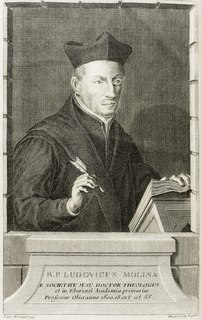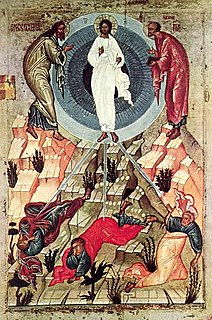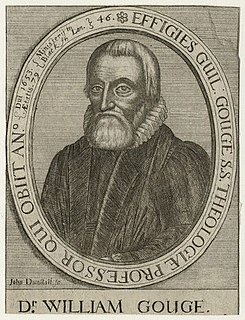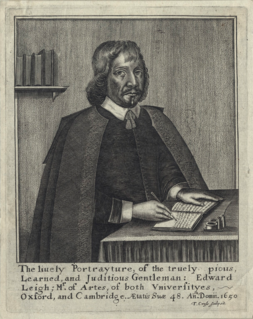Related Research Articles

Tawhid is the indivisible oneness concept of monotheism in Islam. Tawhid is the religion's central and single most important concept, upon which a Muslim's entire religious adherence rests. It unequivocally holds that God as per Islam is One and Single.

Omnipresence or ubiquity is the property of being present anywhere and everywhere. The term omnipresence is most often used in a religious context as an attribute of a deity or supreme being, while the term ubiquity is generally used to describe something "existing or being everywhere at the same time, constantly encountered, widespread, common". Ubiquitous can also be used as a synonym for words like worldwide, universal, global, pervasive, all over the place.

Divine command theory is a meta-ethical theory which proposes that an action's status as morally good is equivalent to whether it is commanded by God. The theory asserts that what is moral is determined by God's commands and that for a person to be moral he is to follow God's commands. Followers of both monotheistic and polytheistic religions in ancient and modern times have often accepted the importance of God's commands in establishing morality.
In Latter-day Saint belief, the restoration refers to a return of the authentic priesthood power, spiritual gifts, ordinances, living prophets and revelation of the primitive Church of Christ after a long period of apostasy. While in some contexts the term may also refer to the early history of Mormonism, in other contexts the term is used in a way to include the time that has elapsed from the church's earliest beginnings until the present day. Especially in The Church of Jesus Christ of Latter-day Saints "the restoration" is often used also as a term to encompass the corpus of religious messages from its general leaders down to the present.

Restorationism is the belief that Christianity has been or should be restored along the lines of what is known about the apostolic early church, which restorationists see as the search for a purer and more ancient form of the religion. Fundamentally, "this vision seeks to correct faults or deficiencies by appealing to the primitive church as a normative model."

The Westminster Confession of Faith is a Reformed confession of faith. Drawn up by the 1646 Westminster Assembly as part of the Westminster Standards to be a confession of the Church of England, it became and remains the "subordinate standard" of doctrine in the Church of Scotland and has been influential within Presbyterian churches worldwide.

The Euthyphro dilemma is found in Plato's dialogue Euthyphro, in which Socrates asks Euthyphro, "Is the pious loved by the gods because it is pious, or is it pious because it is loved by the gods?" (10a)

Molinism, named after 16th-century Spanish Jesuit priest and Roman Catholic theologian Luis de Molina, is the thesis that God has middle knowledge. It seeks to reconcile the apparent tension of divine providence and human free will. Prominent contemporary Molinists include William Lane Craig, Alfred Freddoso, Thomas Flint, Kenneth Keathley, and Dave Armstrong.
John Scotus Eriugena or Johannes Scotus Erigena or John the Scot was an Irish Catholic Neoplatonist philosopher, theologian and poet of the Early Middle Ages. Bertrand Russell dubbed him "the most astonishing person of the ninth century". The Stanford Encyclopaedia of Philosophy states he "is the most significant Irish intellectual of the early monastic period. He is generally recognized to be both the outstanding philosopher of the Carolingian era and of the whole period of Latin philosophy stretching from Boethius to Anselm."

John Goodwin (1594–1665) was an English preacher, theologian and prolific author of significant books.

The Westminster Assembly of Divines was a council of divines (theologians) and members of the English Parliament appointed from 1643 to 1653 to restructure the Church of England. Several Scots also attended, and the Assembly's work was adopted by the Church of Scotland. As many as 121 ministers were called to the Assembly, with nineteen others added later to replace those who did not attend or could no longer attend. It produced a new Form of Church Government, a Confession of Faith or statement of belief, two catechisms or manuals for religious instruction, and a liturgical manual, the Directory for Public Worship, for the Churches of England and Scotland. The Confession and catechisms were adopted as doctrinal standards in the Church of Scotland and other Presbyterian churches, where they remain normative. Amended versions of the Confession were also adopted in Congregational and Baptist churches in England and New England in the seventeenth and eighteenth centuries. The Confession became influential throughout the English-speaking world, but especially in American Protestant theology.
The problem of religious language considers whether it is possible to talk about God meaningfully if the traditional conceptions of God as being incorporeal, infinite, and timeless, are accepted. Because these traditional conceptions of God make it difficult to describe God, religious language has the potential to be meaningless. Theories of religious language either attempt to demonstrate that such language is meaningless, or attempt to show how religious language can still be meaningful.

Mystical theology is the branch of theology that explains mystical practices and states, as induced by contemplative practices such as contemplative prayer.

The Bideford witch trial resulted in hangings for witchcraft in England. Temperance Lloyd, Mary Trembles and Susannah Edwards from the town of Bideford in Devon were tried in 1682 at the Exeter Assizes at Rougemont Castle. Much of the evidence against them was hearsay, although there was a confession by Lloyd, which she did not fully recant even with her execution imminent. These women have been labelled as the last witches to be hanged in England, but there are subsequent cases which are not as well documented.

William Penn was an English writer and religious thinker belonging to the Religious Society of Friends (Quakers), and founder of the Province of Pennsylvania, a North American colony of England. He was an early advocate of democracy and religious freedom, notable for his good relations and successful treaties with the Lenape Native Americans.

William Gouge (1575–1653) was an English Puritan clergyman and author. He was a minister and preacher at St Ann Blackfriars for 45 years, from 1608, and a member of the Westminster Assembly from 1643.
Robert Harris (1581–1658) was an English clergyman, known as a Puritan preacher, member of the Westminster Assembly, and President of Trinity College, Oxford.

Sir Edward Leigh was an English lay writer, known particularly for his works on religious topics, and a politician who sat in the House of Commons from 1645 to 1648.

A sacrament is a Christian rite recognized as of particular importance and significance. There are various views on the existence and meaning of such rites. Many Christians consider the sacraments to be a visible symbol of the reality of God, as well as a channel for God's grace. Many denominations, including the Catholic, Lutheran, Anglican, Methodist, and Reformed, hold to the definition of sacrament formulated by Augustine of Hippo: an outward sign of an inward grace, that has been instituted by Jesus Christ. Sacraments signify God's grace in a way that is outwardly observable to the participant.
John Bartlet, was an English nonconformist divine.
References
![]() This article incorporates text from a publication now in the public domain : "Bartlet, William". Dictionary of National Biography . London: Smith, Elder & Co. 1885–1900.
This article incorporates text from a publication now in the public domain : "Bartlet, William". Dictionary of National Biography . London: Smith, Elder & Co. 1885–1900.